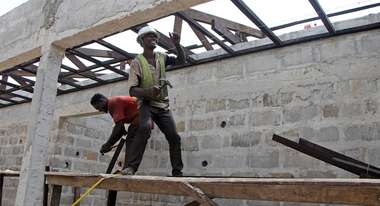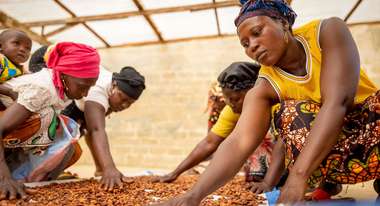The 10th Anniversary of the Voluntary Guidelines on Tenure in Times of Multiple Crises
Welthungerhilfe co-organized two consecutive events on November 28th and 30th to take stock of the guidelines, assess their potential and pave the way forward for responsible land governance and food security.
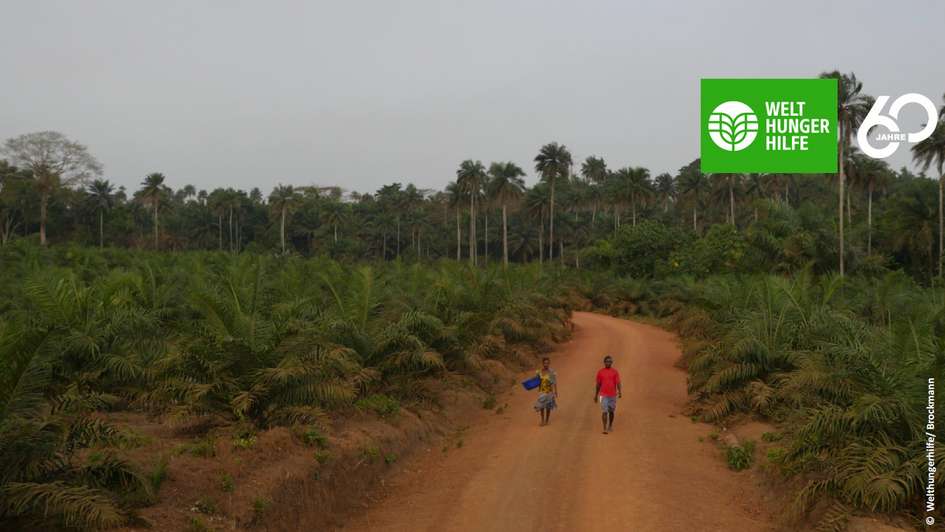
In times of multiple crises, such as conflicts, the COVID-19 pandemic, climate change, and rising global food prices, the pressure on land resources continues to grow. Safeguarding fair and equal access to land remains essential to food security and food systems transformation. The 10th anniversary of the Voluntary Guidelines on Tenure (VGGT) provides an opportunity to take stock of the guidelines, to evaluate them and discuss their potential as a tool to improve both land governance and food security worldwide.
To this end, Welthungerhilfe, together with the German Institute for Global and Area Studies (GIGA) / Land Matrix Initiative (LMI), and International Land Coalition (ILC), and with contributions by TMG Research and Working Group on Peace and Development (FriEnt), co-organized a virtual discussion on November 28th, where international experts and practitioners came together to discuss the impact of the guidelines over the past 10 years, identify gaps and successes in the current context and generate further concrete recommendations for the future.
The invited speakers, Mark Wegerif, on behalf of the VGGT+10 initiative, Jolyne Sanjak, who is responsible for land tenure and property rights at Tera Tech ARD, and Ward Anseeuw, co-founder of the Land Matrix Initiative, shared their perspectives on the impacts of the VGGT in the past 10 years. Interactive working groups discussed approaches for improved utilization of the guidelines, such as multi-stakeholder partnerships, or data for accountability. The groups’ participants also linked the land governance debate to further food systems transformation topics, conflict resolution, and human-rights-based tools. Moderated by Lisa Witter and with further inputs by Martin Hoppe from the Federal Ministry for Economic Cooperation and Development (BMZ) and Yonas Mekonen from the ILC, a lively and focused debate arose. Based on the event, a set of written recommendations was produced.

Messages and recommendations from the discussion on November 28th, 2022
SUPPORT A TRANSPARENT AND ACCOUNTABLE APPROACH TO DATA
- National companies and investors should make data transparent and open concerning investments, ownership, and shareholding in land
- Support data initiatives and the establishment of a data ecosystem (covering all aspects of VGGT), their use, and legitimization
- Propose a discussion at the next Committee on World Food Security event to establish a monitoring framework with a clear mandate
SUPPORT INCLUSIVE POLICY PROCESSES
- Support multi-stakeholder platforms (MSPs) in financial, technical, and political terms and ensure long-term commitment
- Address power imbalances (empowerment and capacity building of vulnerable groups, strengthening of inclusive institutions)
SUPPORT A HUMAN RIGHTS–BASED APPROACH TO LAND
- Duty bearers should be held accountable through the human rights system -> Enforce human rights to make the VGGT less voluntary
- Engage national human rights institutions (e.g. in MSPs) and use the mandate of established human rights institutions and monitoring mechanisms
CONFLICT SENSITIVITY
- Private sector actors and their financiers (e.g. development finance institutions) should be held responsible and integrate VGGT principles and conflict sensitivity into their operational frameworks
- Include the VGGT in the elaboration of new and implementation of existing German national policy guidelines (e.g. 2017's “Preventing crises, resolving conflicts, building peace”)
GENERAL POLITICAL COMMITMENT
- Strong support for the VGGT across institutions (no need for VGGT 2.0)
- Avoid silos (crises as an opportunity)
- Across sectors: Give weight to VGGT/land and mobilize other sectors/communities
- Across actors/initiatives: e.g. EU directives on due diligence in global value chains – include a VGGT/human rights approach
- Budget
The discussion thus formed the basis for an in-person political panel in Berlin on November 30th where the jointly developed recommendations were presented by Ward Anseeuw.
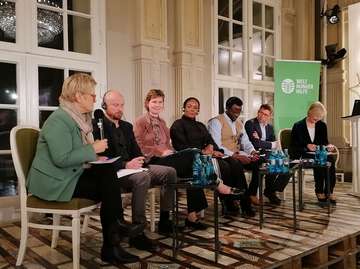
In Berlin, a high-level panel with the member of the German parliament Renate Künast, Swantje Nilsson from the German Ministry for Food and Agriculture; Welthungerhilfe’s Secretary General Mathias Mogge, Ellen O. Pratt from the Liberia Land Authority; Dr. Ward Anseeuw, founder of the Land Matrix Initiative; and Berns Komba Lebbie from Land for Life Sierra Leone, discussed the generated recommendations, the potential of the guidelines for improving food security in times of multiple crises and reflected on Germany’s role in the implementation of the guidelines worldwide. Further inputs were given by Michael Windfuhr, who is the current Deputy Head of the German Institute for Human Rights, and honoree for his role during the negotiations of the VGGT, as well as Michael Taylor, CEO of the ILC.
Jann Lay, Head of Research on Globalization and Development at the German Institute for Global and Area Studies, summarized the key messages of the events, both, in a closing statement and in a written format.
Key messages "The 10th anniversary of the VGGT in times of multiple crises: Securing Food through Land Rights", panel discussion on 11.30.2022 and workshop on 11.28.2022
Jann Lay, GIGA, Berlin and Hamburg, 12.02.2022
(1) The many crises of our day affect us here in Germany and they affect the people in the "Global South", who often have far fewer opportunities to cope with such crises. These global interdependencies have their dark sides, as is shown again and again in connection with large-scale agricultural investments. Yet, global cooperation also holds the promise of agreeing to respect human rights. And the VGGT are a good example of this. They are a central, negotiated and recognized global reference framework and thus a starting point for further agreements such as the CFS-RAI and national reforms and rules. To put it in the words of Michael Windfuhr: "The VGGT are a great text" that describes what states can do to behave in a human rights-compliant manner. And numerous examples, for example from Liberia and Sierra Leone, show that they are indeed helpful for practical work "on the ground".
(2) The VGGT thus keep that promise, but there is still a long way to go – despite some progress. There has been some movement in the implementation of national legislation, for example in Liberia and Sierra Leone, both of which now have progressive land legislation based on the VGGT. However, we also know about the problems of effective implementation of new national rules, especially regarding communal land rights and local governance (role of traditional authorities). At the events, it was often and rightly suggested to look for starting points for implementation that may lie outside the land sector (Get out of the silo land policy!). Issues such as inequality, human rights due diligence in global supply chains, but also land for a just global energy transition can become important levers for an effective implementation of the VGGT. Keep going! Implement! But also assert – because the land question is also a question of power – were recurring calls of the evening.
(3) It is precisely the link to debates on sustainable supply chains that is crucial: even if more sustainable food systems are likely to be less global and thus more local, we will still have trade in agricultural goods and food. In a sustainable (and more local) food system, smallholder structures and thus smallholder land rights have a central role to play. Trade and the activities of multinational companies and investors must continue to be scrutinized. And the VGGT are an important element in achieving a more sustainable food system and more sustainable global supply chains that respect human rights.
Below is a recording of the Berlin event with subtitles.
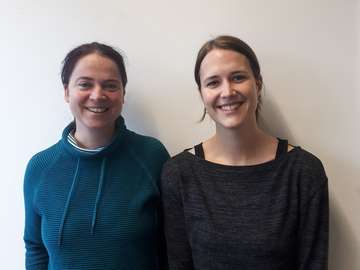
For inquiries, please refer to:
Mirjam Harteisen
Policy & External Relations
Senior Advisor
+49 (0)228 2288-582
mirjam.harteisen(at)welthungerhilfe.de
Anna Schreiber
Policy & External Relations
Project Manager Land for Life
+49 (0)228 2288-704
anna.schreiber(at)welthungerhilfe.de






